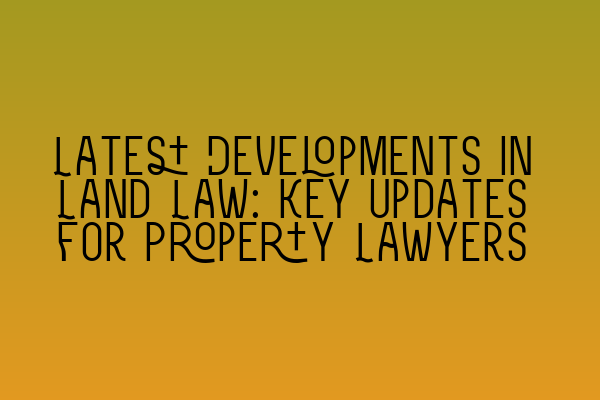Latest Developments in Land Law: Key Updates for Property Lawyers
As property lawyers, staying up-to-date with the latest developments in land law is crucial to providing the best possible service to your clients. Land law is a complex and ever-evolving area of practice, with new cases, legislation, and legal principles shaping the landscape. In this blog post, we will highlight some of the key updates in land law that property lawyers should be aware of.
1. The Supreme Court Decision in Williams v Glyn: In a landmark ruling, the Supreme Court clarified the extent of a landowner’s liability for environmental contamination. The case set a precedent that landowners can be held liable for historical contamination caused by previous owners, even if they were unaware of the contamination at the time of purchase. This decision has significant implications for property lawyers advising clients on property transactions and environmental due diligence.
2. The Law Commission’s Proposed Reforms on Easements: The Law Commission has recently published a consultation paper proposing reforms to the law on easements. The proposed changes aim to modernize and simplify the legal framework surrounding easements, making it easier for parties to understand their rights and obligations. Property lawyers should familiarize themselves with these reforms to ensure they can provide accurate and comprehensive advice to their clients.
3. Virtual Property Viewings: The COVID-19 pandemic has accelerated the adoption of virtual property viewings. Property lawyers need to be knowledgeable about the legal implications of virtual viewings, including the use of technology to verify property conditions, contractual obligations, and the potential for misrepresentation claims. Keeping abreast of the latest guidance and best practices in this area is essential for property lawyers adapting to the changing landscape of property transactions.
4. Leasehold Reform: Leasehold reform has been a hot topic in recent years, with proposals to address the perceived unfairness and abuses in the leasehold system. Property lawyers should be aware of the government’s proposed reforms, such as the ban on leasehold houses and ground rent reforms. Additionally, they should stay informed about any updates in the legislation and be prepared to advise clients on the implications of these reforms for their leasehold properties.
5. Changes to the Right to Manage Procedure: The Right to Manage (RTM) allows leaseholders to take over the management of their building from the freeholder. Recent changes to the RTM procedure have made it easier for leaseholders to exercise this right. Property lawyers should be familiar with these changes and understand the procedural requirements to effectively assist leaseholders seeking to exercise their right to manage.
6. The Land Registry’s Digital Transformation: The Land Registry has been undergoing a significant digital transformation, including the introduction of a new digital registration service. Property lawyers should familiarize themselves with the changes and the implications for their practice, such as the electronic submission of documents and the availability of online access to land registers. Adapting to the digital era is essential for property lawyers to streamline processes and enhance efficiency.
7. Case Law Updates: There have been several noteworthy land law cases in recent months that property lawyers should be aware of. For example, the Court of Appeal decision in Smith v Allen clarified the requirements for adverse possession claims, while the case of Spencer v Taylor addressed the issue of implied easements. Keeping abreast of the latest case law developments is crucial for property lawyers to provide accurate and up-to-date advice to their clients.
In conclusion, staying updated with the latest developments in land law is essential for property lawyers to provide effective and comprehensive advice to their clients. The landscape of land law is constantly evolving, and property lawyers must keep pace with changes in legislation, case law, and industry practices. By staying informed and adapting to these developments, property lawyers can ensure they are delivering the highest standard of service to their clients.
If you’re looking for comprehensive courses to prepare for the SRA SQE exams and stay abreast of the latest developments in land law, our SQE 1 and SQE 2 Preparation Courses offer the perfect solution. You can also check out our practice exam questions and practice mocks to assess your knowledge and improve your performance. Additionally, make sure to stay updated with the SRA SQE exam dates to plan your preparation effectively.
Sources:
– SQE 1 Practice Exam Questions
– SQE 1 Practice Mocks FLK1 FLK2
– SQE 2 Preparation Courses
– SQE 1 Preparation Courses
– SRA SQE Exam Dates
